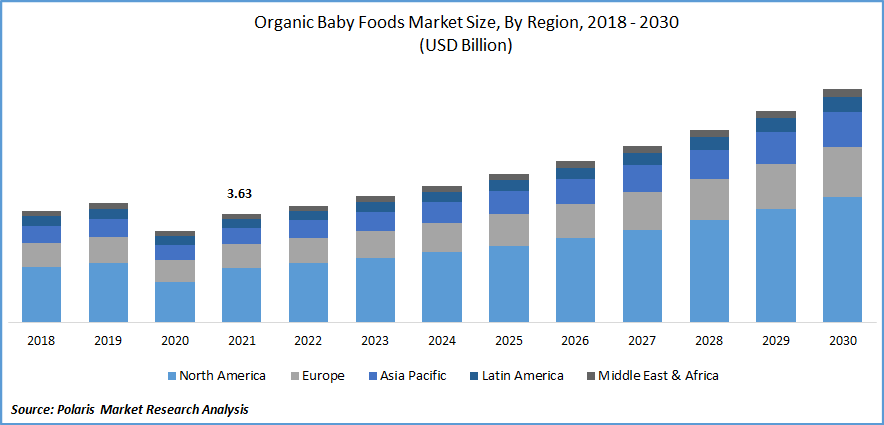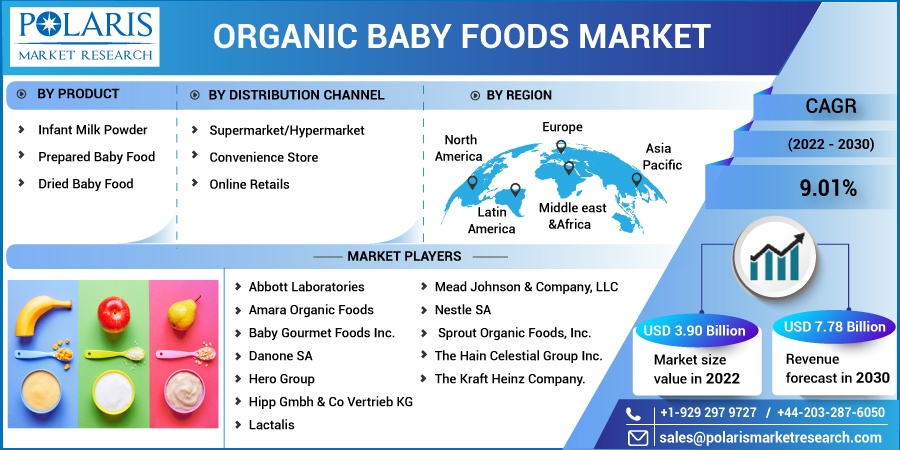
Organic Baby Food Market Share, Size, Trends, Industry Analysis Report, By Product (Infant Milk Powder, Prepared Baby Food, Dried Baby Food); By Distribution Channel; By Region; Segment Forecast, 2022 - 2030
- Published Date:Nov-2022
- Pages: 117
- Format: PDF
- Report ID: PM2762
- Base Year: 2021
- Historical Data: 2018-2020
Report Outlook
The global organic baby food market was valued at USD 3.63 billion in 2021 and is expected to grow at a CAGR of 9.01% during the forecast period.
Organic infant food is organic food that hasn't been grown or processed with antibiotics, growth hormones, pesticides, or other potentially dangerous substances. Babies are soft and sensitive in general; they react differently to every stimulus. Babies are especially vulnerable to foodborne sickness because their immune systems are not fully developed to combat infections. As a result, the reasons stated above have given rise to the organic baby food sector, which is produced with great care.

Know more about this report: Request for sample pages
Organic baby foods are those that are grown or prepared without the use of synthetic fertilizers or pesticides. The global demand for this food is steadily increasing as parents become more aware of meeting their kids' nutritional needs.
Over the projected period, market growth is anticipated to be aided by the expanding organic food and beverage sector and rising consumer expenditure on baby food items. Growing parental concerns about children's health and nutrition in industrialized and developing nations have been significant market drivers in recent years.
Additionally, consumer knowledge of the advantages of organic food items is growing, which is fueling market expansion. The growing demand for packaged organic food, such as ready-to-eat, foreshadows the expansion of the global industry. Additionally, the expected expansion of the market over the forecast period is attributed to the growing number of working women around the world. Additionally, trends like clean-label production and nutrient-dense infant food regimens drive the industry.
The widespread use of baby food, which assists in developing the nervous system, and the growth in consumer knowledge of the product's numerous benefits all impact the market. Furthermore, rising urbanization, increased organized retail marketing, and malnutrition occurrences all have a favorable influence on the infant food business. Organic goods are popular, and they are a big trend in the infant food industry. According to a 2018 article in The Hindu, inorganic baby products contain several synthetic substances that may create health problems. As a result, parents are increasingly opting for organic and natural goods to offer their infants nutritious food that is both sustainable and safe. Furthermore, during the COVID-19 epidemic, clients' choices changed toward internet platforms.
The COVID-19 epidemic has had a significant influence on the world market for organic baby foods. The COVID-19 pandemic lockdown had a huge impact on the demand and supply chain for baby food items all across the world, disrupted transportation, and halted the delivery of raw materials. Still, Covid -19 emerged as product sourcing via online websites, which tends to the market’s popularity to flourish. Also, influencer marketing and social media marketing benefited the market to grow as well as recognized among peers as trendy. Consequently, a robust market growth rate is anticipated in the future years.
 Know more about this report: Request for sample pages
Know more about this report: Request for sample pages
Industry Dynamics
Growth Drivers
Organic infant food product sales continue to rise in the retail business. Baby food is widely available through online sales channels such as supermarkets, hypermarkets, e-commerce, and department stores, which has a significant beneficial influence on market growth globally. Market growth is expected to be helped by the expansion of the organic food and beverage sector, as well as increased consumer expenditure on baby food products, throughout the forecast period. Consumers' improving understanding of the benefits of organic food is another element driving market.
However, the growth is being stifled by the government's stringent rules and regulations regarding labeling of products high operational expenses involved. Meanwhile, Britannica predicts that government restrictions in countries like the U.S., Germany, the United Kingdom, China, and India will ensure the quality of organic infant food. According to WHO reports, in the United States, government agencies such as the Food and Drug Administration (FDA) and the United States Department of Agriculture (USDA) enforce several federal rules and standards on manufacturers of organic food items.
Report Segmentation
The market is primarily segmented based on form, product, distribution channel, and region.
|
By Product |
By Distribution Channel |
By Region |
|
|
|
Know more about this report: Request for sample pages
Infant Milk Powder emerged as the largest product segment in 2021
Infant Milk Powder dominated the organic baby food market in 2021. The growth in this segment can be attributed to high adoption of the product on account rising number of working mothers, hectic lifestyle and growing inclination toward organic products. In addition, suboptimal breastfeeding rate on account of premature birth and hormonal disorders is one of the major factor driving the segment growth.
Since chemical-free, healthy food is becoming more and more popular, market growth is anticipated during the forecast period. Innovative organic products are increasingly popular because they provide newborns with quick, easy, and handy sources of nourishment and energy. From 2022 to 2030, the dried baby food market is anticipated to expand at the second-highest growth rate.
The industry is expanding due to the availability of easy, wholesome, dried infant food through retail channels. In addition, the rising popularity and demand for packaged organic foods, along with rising consumer disposable income, are key drivers of market expansion.
Supermarket/Hypermarket accounted for a significant market share in 2021
When buying consumer goods, groceries, and infant care items, consumers increasingly prefer to shop at hypermarkets and supermarkets where they can physically inspect the goods. Due to improved distribution channel networks and inventory management, technology and strategies worldwide have uplifted supermarkets and hypermarkets to maintain their dominance during the projection period.
High CAGR is anticipated for the market's online retail segment from 2022 to 2028, making it the segment with the fastest-growing projections. The percentage of people using the internet has increased significantly in recent years, and the global e-commerce industry's continued expansion is quickening market growth. Additionally, young people are increasingly using mobile apps and internet purchasing platforms, which will drive the market demand.
The demand in North America is expected to witness significant growth
To meet customer demand, makers of organic packaged food items will have opportunities to develop organic infant food products as the number of newborns rises in the U.S. and Canada. In the approaching years, industry growth is predicted to be boosted by consumers who are worried about their babies' health. Because of the increased awareness of the need for adequate nutrition for newborns, the market for organic baby food in North America is vast. Also, the rising social media usage and influencer marketing among the region has also prompted the growth of the market for major companies that source from this global area.
Furthermore, the market is predicted to grow in Asia Pacific, with growing economies such as India and China seeing increased demand for organic baby food. Also, Europe is the market that is predicted to expand the fastest CAGR over a study period. The market for packaged organic foods is expected to develop due to rising consumer demand for these goods' high nutritional value and environmental friendliness. Additionally, the creation of novel mixes by manufacturers that pair well with organic baby food has predicted market growth over the period of forecasting in this region.
Competitive Insight
Some of the major players operating in the global market include, Abbott Laboratories, Amara Organic Foods, Baby Gourmet Foods, Danone SA, Hero Group, Hipp GMBH, Lactalis, Mead Johnson & Company, LLC, Nestle, Sprout Organic Foods, Hain Celestial, and Kraft Heinz Company.
Recent Developments
- In July 2020, Gerber Organic released its new product, puffed corn and in the right size for young fingers.
- In June 2020, Heinz updated their baby food line with the introduction of HEINZ BY NATURETM baby food, a new line-up of baby food that includes organic and natural ingredients, as well as acerola cherry.
Organic Baby Food Market Report Scope
|
Report Attributes |
Details |
|
Market size value in 2022 |
USD 3.90 billion |
|
Revenue forecast in 2030 |
USD 7.78 billion |
|
CAGR |
9.01% from 2022 - 2030 |
|
Base year |
2021 |
|
Historical data |
2018 - 2020 |
|
Forecast period |
2022 - 2030 |
|
Quantitative units |
Revenue in USD billion and CAGR from 2022 to 2030 |
|
Segments covered |
By Product, By Distribution Channel, By Region. |
|
Regional scope |
North America, Europe, Asia Pacific, Latin America; Middle East & Africa |
|
Key companies |
Abbott Laboratories, Amara Organic Foods, Baby Gourmet Foods Inc., Danone SA, Hero Group, Hipp Gmbh & Co Vertrieb KG, Lactalis, Mead Johnson & Company, LLC, Nestle SA, Sprout Organic Foods, Inc., The Hain Celestial Group Inc., and The Kraft Heinz Company. |
